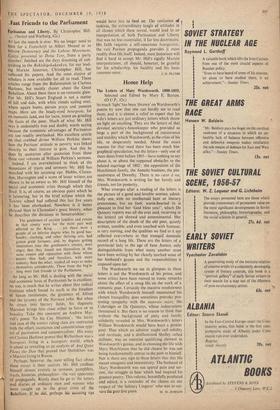Home Help
The Letters of Mary Wordsworth. 18004855. Selected and Edited by Mary E. Burton. (0.U.P., 42s.) So much 'light' has been 'thrown' on Wordsworth's poems by now that one can hardly see to read them, and it is almost a relief to report that his wife's letters are just ordinary letters which throw no light on anything. They are the letters of that devoted secretary-housekeeper who provided so large a part of the background of reassurance and stability which Wordsworth, at the crisis of his life, so desperately needed. About the exact reasons for that need there has been much bio- graphical speculation, but the letters—only one of them dates from before 1805—have nothing to say about it, or about the supposed obstacles to the belated marriage of 1802: the opposition of the Hutchinson family, the Annette business, the pos- sessiveness of Dorothy. There is no emir it nu; Mrs. Wordsworth is writing for her family and friends, not for posterity.
What emerges after a reading of the letters is the picture of a good and lovable woman, admit- tedly one with no intellectual bent or literary pretensions, but no fool; warm-hearted (it is pleasant to find her 'God bless you!', which De Quincey reports was all she ever said, recurring in the letters) yet shrewd and unsentimental. Her -description of the death of the old poet, quietly written, sensible, and even touched with humour, is very moving, and the qualities we find in it are reflected everywhere in that tranquil domestic record of a long life. These are the letters of a provincial lady in the age of Jane Austen, only distinguishable from what many another must have been writing by her clearly marked sense of her husband's genius and the responsibilities it imposed upon her.
The Wordsworth we see in glimpses in these letters is not the Wordsworth of his prime, and some critics have been moved to ironic remarks about the effect of a smug life on the work of a romantic poet. Certainly the massive resoluteness with which Wordsworth himself maintained his chosen tranquillity does sometimes provoke pro- testing sympathy with the ntauvais sujets, the- Coleridges or De Quinceys, whose indiscretions threatened it. But there is no reason to think that without the background of piety and family solidarity revealed in Mrs. Wordsworth's letters William Wordsworth would have been a greater poet. That which an admirer might call solidity and rectitude, and a disillusioned Shelley called dullness, was an essential qualifying element in Wordsworth's genius, and in choosing the life with Mary Hutchinson that he did choose he was not .being fundamentally untrue to the poet in himself.
Nor is there any sign in these letters that this life meant smugness and insensitivity. The husband of Mary Wordsworth was not spared pain and sor- row, the struggle to bear which had inspired his greatest poetry. This volume, beautifully produced and edited, is a reminder of the claims on our respect of 'the Solitary Lingerer' who was to sur-

























 Previous page
Previous page